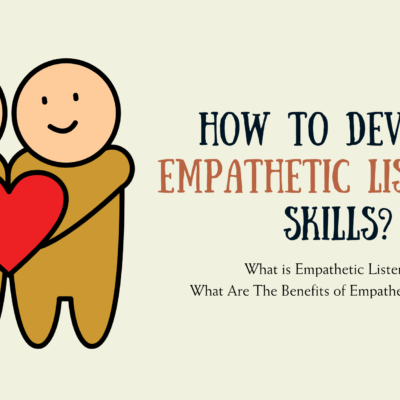How to Develop Empathetic Listening Skills: Empathetic listening is a basis of effective communication, allowing you to connect with others on a deeper level, build trust, and promote understanding. Unlike passive hearing, empathetic listening includes completely engaging with others, and seeking to understand their perspectives, emotions, and experiences without judgment.
Also Read:
- How to Improve Emotional Wellness at Work?
- Strategies for Healing After Emotional Abuse.
- Mental Breakdown- Signs, Causes and Treatment.
- How to Get Mind to Stop Racing?
- 10 Tips to Become a Better Listener.
Developing empathetic listening skills is important not only for building strong relationships but also for handling conflicts, encouraging empathy, and facilitating personal growth. So, here in this article, we will talk about what empathetic listening is and strategies to develop empathetic listening.
What is Empathetic Listening?
Empathetic listening goes beyond just hearing words; it includes adjusting to the speaker’s thoughts, emotions, and underlying messages. When practicing empathetic listening, people desire to create a supportive, non-judgmental space where others feel heard, valued, and understood. This requires not only paying attention to verbal cues but also observing body language, tone of voice, and other subtle indicators of the speaker’s emotional state.
At its core, empathetic listening is about demonstrating empathy—a basic part of emotional intelligence. By putting themselves in the speaker’s shoes and seeing the world from their point of view, you can develop deeper connections and develop stronger relationships. Empathetic listening promotes trust, validates others’ experiences, and promotes mutual respect, laying the groundwork for effective communication.
What Are The Benefits of Empathetic Listening?
Improved Relationships
Empathetic listening strengthens bonds between people, promoting intimacy, and trust. By showing genuine interest and understanding, listeners can deepen their connections with others and encourage healthier, more fulfilling relationships.
Improved Communication
Empathetic listening encourages open, honest communication, enabling people to express themselves more freely and authentically. By creating a safe space for discussion, listeners encourage meaningful conversations and promote mutual respect.
Conflict Resolution
Empathetic listening plays an important role in settling conflicts and handling misunderstandings. By accepting others’ points of view and validating their feelings, people can defuse tensions, find common ground, and work towards mutually acceptable solutions.
Promotion of Empathy
Engaging in empathetic listening motivates others to reciprocate, promoting a culture of empathy and compassion. By modeling empathetic behavior, people can inspire others to adopt similar attitudes and behaviors, creating ripple effects that extend beyond personal interactions.
Personal Growth
Practicing empathetic listening promotes self-awareness and empathy, encouraging personal growth and development. By learning to understand others’ viewpoints, people gain valuable insights into themselves and develop a deeper gratitude for the variety of human experiences.
How to Develop Empathetic Listening Skills?
While empathetic listening is a natural skill for many people it can be developed and refined through practice. Here are some practical methods to help grow empathetic listening skills:
Active Listening
Practice active listening by keeping eye contact, nodding in acknowledgment, and using verbal cues (e.g., “I see,” “Go on”) to signal your engagement with the speaker. Avoid distractions and concentrate your attention completely on the conversation at hand.
Paraphrasing
Paraphrasing includes repeating the speaker’s words in your own words to confirm your understanding and indicate empathy. For example, you might say, “It sounds like you’re feeling frustrated because…” This method shows that you are actively listening to the speaker’s feelings.
Reflective Statements
Use reflective statements to mirror the speaker’s emotions and validate their experiences. For instance, you might say, “It seems like you’re upset about…” or “I can understand why you would feel that way.” Reflective statements express empathy and help the speaker feel heard and understood.
Ask Questions Openly
Enable the speaker to elaborate on their thoughts and feelings by asking open-ended questions that invite more in-depth reflection and exploration. Avoid yes-or-no questions and instead ask questions like, “How did that make you feel?” or “Can you tell me more about what happened?”
Summarize
Periodically summarize the speaker’s key points to provide clarity and reinforce understanding. Summarization includes condensing the main ideas of the conversation into concise statements, which helps both parties stay attentive and on track.
Silence
Embrace moments of silence as opportunities for reflection and processing. Allow the other person to express themselves at their own pace without feeling rushed or pressured to fill the silence. Silence can be a powerful tool for promoting reflection and deepening the conversation.
Empathetic Responses
React to the speaker’s emotions with empathy and compassion, accepting their feelings without judgment or criticism. Offer words of validation and support, such as “I’m here for you,” or “That sounds challenging.”
Practice Mindfulness
Develop mindfulness through meditation, deep breathing exercises, or other mindfulness practices that encourage present-moment awareness and attentiveness.
Take Feedback From Others
Ask for feedback from others on your listening skills and areas for improvement. Reflect on the feedback received and make adjustments as required to improve your empathetic listening abilities.
Learn Continuously
Stay curious and open to learning about different viewpoints, experiences, and cultures. Engage in activities that broaden your understanding of human emotions and behaviors, such as reading literature, attending workshops, or participating in diversity training.
Reflective Journaling
Keep a reflective journal to track your progress in creating empathetic listening skills. Note down your observations, insights, and challenges faced along the way, and determine areas for growth and development.
Role Modeling
Lead by example by showing empathetic listening in your interactions with others. Act as a role model for friends, family members, colleagues, and peers, and inspire them to develop their empathetic listening skills.
At The End
Empathetic listening is a powerful tool for building connections, promoting understanding, and promoting personal and professional growth. By mastering the art of empathetic listening, people can develop deeper relationships, fix conflicts, and handle the complexities of human interaction with grace and compassion.
Through practice, patience, and a genuine commitment to understanding others, empathetic listening can become not only a skill but a way of life—one that enriches our relationships, improves our communication, and promotes greater empathy and compassion in the world.








